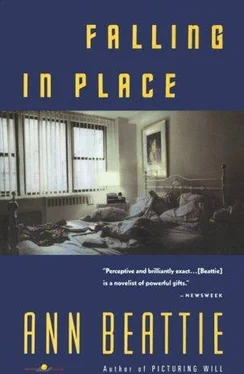Ann Beattie - Falling in Place
Здесь есть возможность читать онлайн «Ann Beattie - Falling in Place» весь текст электронной книги совершенно бесплатно (целиком полную версию без сокращений). В некоторых случаях можно слушать аудио, скачать через торрент в формате fb2 и присутствует краткое содержание. Год выпуска: 1991, Издательство: Vintage, Жанр: Современная проза, на английском языке. Описание произведения, (предисловие) а так же отзывы посетителей доступны на портале библиотеки ЛибКат.
- Название:Falling in Place
- Автор:
- Издательство:Vintage
- Жанр:
- Год:1991
- ISBN:нет данных
- Рейтинг книги:4 / 5. Голосов: 1
-
Избранное:Добавить в избранное
- Отзывы:
-
Ваша оценка:
- 80
- 1
- 2
- 3
- 4
- 5
Falling in Place: краткое содержание, описание и аннотация
Предлагаем к чтению аннотацию, описание, краткое содержание или предисловие (зависит от того, что написал сам автор книги «Falling in Place»). Если вы не нашли необходимую информацию о книге — напишите в комментариях, мы постараемся отыскать её.
Falling in Place — читать онлайн бесплатно полную книгу (весь текст) целиком
Ниже представлен текст книги, разбитый по страницам. Система сохранения места последней прочитанной страницы, позволяет с удобством читать онлайн бесплатно книгу «Falling in Place», без необходимости каждый раз заново искать на чём Вы остановились. Поставьте закладку, и сможете в любой момент перейти на страницу, на которой закончили чтение.
Интервал:
Закладка:
Ann Beattie
Falling in Place
FOR
J. D. O’Hara
One

JOHN JOEL WAS high up in the tree, the one tall tree in the backyard. Forget the stick-y lilacs and the diseased peach tree with branches that splayed like umbrella spokes. The tree he was in was a great tree. The robins had left their nest early in the week, so John Joel had his favorite resting place back: the tenth branch up, the one that he could crawl out on, high above his mother’s Chevy and the small kidney-shaped pool, now empty, that in previous summers had held goldfish, tadpoles and water lilies, and that now was filled with sticks and leaves no one had cleared out when winter ended.
“Frog face,” his sister Mary said. She crossed her eyes and puffed her cheeks in and out. She was coming home from her friend Angela’s house, and she had cut through the empty lot between their houses, even though she had been told not to because of poison ivy.
“I hope you get poison ivy,” John Joel said.
Mary was going to summer school because she had flunked English. Every morning from nine to twelve she went to school. Then she went to Angela’s and listened to the new Peter Frampton album. Angela’s mother worked, so no one was home to object.
She had her book bag with her, filled with books. The bag had “Peter Frampton” imprinted on it and there were hearts instead of the “a” and “o” of Frampton. Mary was swinging the book bag. Behind her was the field of poison ivy and wild strawberries, daisies and phlox.
“Blaaaaaaaa,” John Joel retched, and spit out a glob of saliva.
Mary watched it fall. It landed at the side of the kidney-shaped pool.
“Save the rest to grease your cock in case a skunk comes by you want to screw,” Mary said.
She went into the house. She dropped her bag by the door and went upstairs to her room. She looked out the window and saw her brother lying on his stomach along the tree branch. She was glad that he had decided to stay there instead of coming into the house to bother her. She opened the window and pushed her hair back and clutched it in one hand, in a ponytail, as if there were a breeze; then she went to the bureau and got a brush and began to brush her hair. Her hair was damp. It was July. She was wearing powdered eye shadow instead of stick, because her face got so damp. On days when her mother drove her to school, she wore stick. Her mother’s car was air conditioned, and Mary didn’t care what she looked like getting out of school — just what she looked like going in. She hated summer school and thought it was as bad as jail. It would have been jail, except that Angela had also flunked English, and they sat together. Their teacher was named Cynthia Forrest, and Mary loathed her about as much as she loathed John Joel and a little more than she loathed Lloyd Bergman, who had given Angela a hickey on her tit.
Cynthia Forrest had graduated from Bryn Mawr and she was studying for her Ph.D. at Yale. She had sent around a notice with a drawing of herself at the top and that information, and she had made all the summer school students take the notice home to their parents and bring it back signed, so she could be sure that they had seen it. She really thought she was hot shit. All those mimeographed handouts with the drawings of her turned-up nose and her credentials coming back with names signed at the bottom: Art and Alice Dwyer (“Keep up the good work!”), Marge Pendergast, J.D.O. (“I’m a Harvard grad myself”), Cici Auerberg (“Mrs. Charlie Auerberg”). Shit . Let her have her fancy credentials. She was still stuck in summer school like the rest of them.
Imagine: She was having them read Great Books. They weren’t reading the entire book, though, because there wasn’t time. There wasn’t time, and, as Lloyd Bergman said, they were so stupid that they wouldn’t understand what was going on anyway, so they were reading parts of books. They had already read “The Pardoner’s Tale,” Act One of She Stoops to Conquer and Chapter One of Vanity Fair . Next week they had to read more of Vanity Fair and Chapter One of A Tale of Two Cities . And Pride and Prejudice: They were to open Pride and Prejudice at random, and whatever page they opened to, they were to read the whole chapter that page appeared in. The end of the course, the most up-to-date the course got, was — get ready for this— The Old Man and the Sea .
Mitch Auerberg had hit a squirrel on his motorcycle and had brought it to school in a plastic bag inside a paper bag, and while Billy Fields distracted Cynthia by clutching his stomach and stumbling away from his desk pretending to be about to throw up in the hall, Auerberg switched the bag with her lunch bag and crammed her sprout salad sandwich — that was really what she ate — into his desk. The day before that he had opened a bottle of ink and poured it in his desk. Not for any reason, just to see what would happen. The ink was still there, and it looked like the same size puddle. As he lowered the top of the desk, the lunch bag began to turn black.
“Is this all a joke, Billy?” Lost in the Forest said to Billy in the hallway. He was heaving with laughter as well as faked nausea.
Mary put on a Peter Frampton T-shirt and went into the bathroom to throw her other shirt into the laundry hamper. There was a quarter on top of the hamper, so she pocketed it. As her father would say, it was important to have money, because if you had money, you could buy the Brooklyn Bridge. She braced her arm on the bathroom sink and leaned forward to look at her blue eyes in the bathroom mirror. They were her best feature. The eye shadow had stayed on pretty well. She went downstairs and got a Tab out of the refrigerator and went upstairs and slipped the curl of metal from the can under John Joel’s sheet. On second thought, she pulled the sheet back and put it farther down in the bed, where his feet might get cut by it. Then she tangled the sheets again. He was a pig; he never made his bed. A breeze was blowing through his window. His room got more air than hers. She closed his window. Downstairs, she collapsed in a kitchen chair. It was Wednesday. Her mother was being a do-gooder at the hospital and wouldn’t be home for another hour. She went into the den and put Linda Ronstadt on the stereo. She shook her head at how good Linda Ronstadt was.
Lost in the Forest was probably home at her condo — Billy Fields had followed her home and found out that was where she lived, in a yucky condo — and she was probably having — what would she have? — an iced tea, and listening to Vivaldi. She was probably conducting Vivaldi with the tail end of her braid, ordering the musicians around. Certain books were like Vivaldi, Lost in the Forest thought. When she had said this, she had cupped her hand and curved her four fingers toward her thumb, making a little crab-claw. And she had stared at it. It was one of her intense gestures. The other one she used a lot was putting her thumb and first finger between her eyes and pressing the sides of her nose. She had done that after she read the first two lines of “The Pardoner’s Tale.”
The other thing Billy and Auerberg had thought to do, which was so funny, was to get hold of Anthony O’Dell — he had had to start summer school late because his father died and he had to ride the train with his mother to bury his father in Chicago — and convince him it would be funny if he lisped and stuttered. O’Dell did it, and very well — he raised his hand all the time and did it so convincingly that by the time a few days had gone by, they just wanted him to snap out of it.
Читать дальшеИнтервал:
Закладка:
Похожие книги на «Falling in Place»
Представляем Вашему вниманию похожие книги на «Falling in Place» списком для выбора. Мы отобрали схожую по названию и смыслу литературу в надежде предоставить читателям больше вариантов отыскать новые, интересные, ещё непрочитанные произведения.
Обсуждение, отзывы о книге «Falling in Place» и просто собственные мнения читателей. Оставьте ваши комментарии, напишите, что Вы думаете о произведении, его смысле или главных героях. Укажите что конкретно понравилось, а что нет, и почему Вы так считаете.












